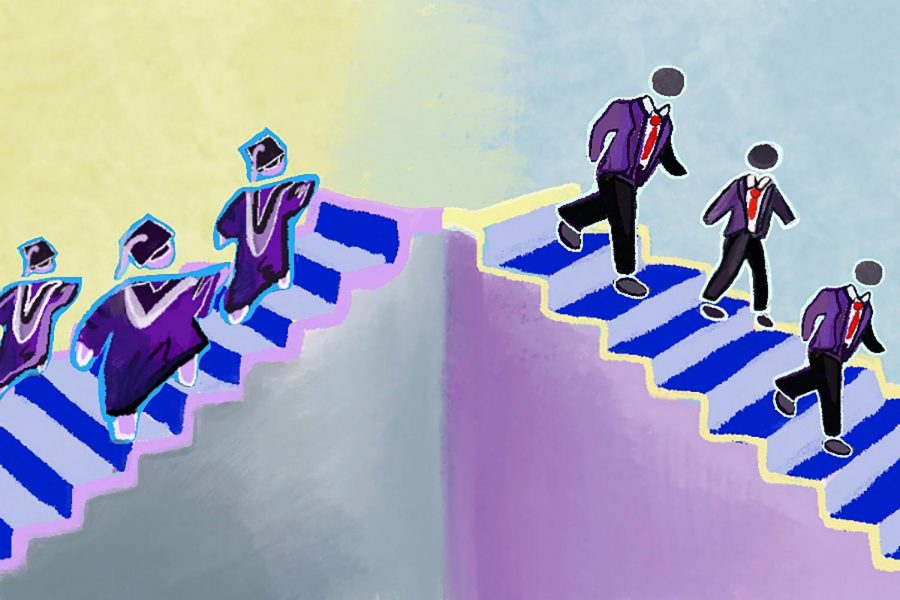Northwestern seniors face uncertainty as they enter a slacking job market
April 29, 2020
In a world without the coronavirus outbreak, Communication senior Shealyn Abbott would have currently been working for the Chicago Cubs, writing press releases for the club and helping out in the press box during games. Instead, she’s sitting at her parent’s Minnesota home, taking classes online.
“It’s really stressful for me mostly because I felt like I was finally getting my life together,” she said of the Cubs’ decision to postpone her start date. “I’m coming to terms with the fact that I may have to take a job that is not in my desired industry for a while, which is kind of disappointing.”
Abbott and hundreds of other upcoming Northwestern graduates face a slacking job market as stay-at-home orders across the country force employers to implement hiring freezes. The lack of jobs is discouraging to some seniors as they struggle to find opportunities that meet their interests — or any positions at all.
About four in 10 North American employers had frozen or reduced hiring by late March, according to Willis Towers Watson, which surveyed 812 companies that together employ nearly 9.3 million workers. That number is likely to increase — the St. Louis Federal Reserve Bank estimated unemployment could reach as high as 32 percent.
Entry-level employees are hardest hit by recessions, as firms are likely to implement hiring freezes before layoffs. SESP Prof. Hannes Schwandt, a labor and health economist, said seniors might be forced to take a job that pays less, or one in an industry that was not their first choice.
“In general, we know that, unfortunately, young labor market entrants and graduates are particularly strongly hit in a typical recession,” he said. “Current workers, they already have a job. While firms also layoff people, they might first have a hiring freeze, and then layoff people, rather than the other way around.”
But this recession isn’t like others. Unemployment numbers unparalleled in modern economic history — with jobless claims totalling over 26 million since mid-March — foreshadow stronger negative effects, at least temporarily. And different industries are targeted differently by coronavirus-related public policies.
Mark Presnell, the executive director of Northwestern Career Advancement, said the transportation, travel and art industries seem to have contracted the most. Public health and government positions, on the other hand, tend to be more recession-proof.
Still, not all public sector jobs are cushioned from the coronavirus recession.
As an upcoming Govern for America fellow who started the application process in November, Communication senior Jillian Gilburne was excited to join Michigan’s Department of Labor and Economic Opportunity to help redesign its unemployment filing process. This was a “perfect alignment,” she said, especially when the agency’s relevance grew as jobless numbers soared.
But last month, the program told her it would reassign her after Michigan Gov. Gretchen Whitmer ordered a hiring freeze. Now, Gilburne is waiting to hear back about a position in Louisiana’s education department.
“I’ve been told ‘yes’ and then ‘no’ so many times in the past few months,” she said. “I will not feel comfortable until I have a contract and a start date, and I don’t know what that’s going to be.”
Overall, the “vast majority” of employers who already extended full-time offers to Northwestern students are honoring those commitments, Presnell said. These include industries that typically hire in the fall, like consulting, finance, engineering and technology.
Students whose career search comes closer to graduation — those entering marketing, media or entertainment, for example — will likely find it takes “longer than expected,” he said.
Medill senior Debbie-Marie Brown, who will begin the Master of Science in Journalism program next January, is delaying her graduation from this spring after finding it more financially viable. Still in need of a summer position, she started reaching out to older colleagues for entry reporter positions in the journalism field.
“I ended up … reaching out to seniors that were at internships that I was at when I was a freshman in Chicago,” Brown said. “Now instead of finding places, I’m going to directly ask people that I know if they know people are hiring.”
Job-seekers will have to take more initiative like this, Presnell said, though Northwestern’s career office is also stepping in to provide relief.
NCA is adding appointment times and reaching out to employers and alumni to connect students with additional job opportunities. Still, Presnell said students will have to “take this process and turn it from an application process to a communication process” by doubling down on networking with alumni and prospective employers.
“There’s certainly fewer opportunities, but there are good opportunities out there,” he said. “Part of our role as the Career Services Office is really helping to reduce that anxiety and support students as they go through this process in finding those good options out there.”
Email: aperez@u.northwestern.edu
Twitter: @_perezalan_



